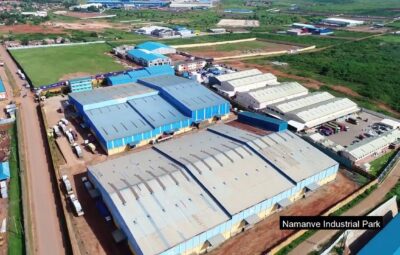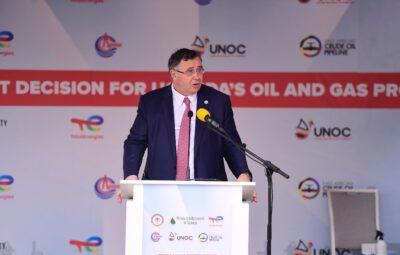UAE is undoubtedly the Arab world’s second-largest economy and this is not by accident but decisions and strategies their leaders make. One of the recent outstanding one being the “Operation 300 bn”. It is a national industrial strategy aimed at raising the manufacturing sector’s contribution from Dh133 to Dh300 billion by 2031. The strategy was named Operation 300bn because of its ultimate goal of raising the industrial sector’s contribution to the GDP from AED 133 billion to AED 300 billion by 2031.
What Goal?
Launched by His Highness Sheikh Mohammed bin Rashid Al Maktoum, Vice President and Prime Minister of UAE and Ruler of Dubai, in March 2021, the technical goal of the mega strategy was to support the setting up of 13,500 industrial companies and help increase spending on research and development in the industrial sector from Dh21 billion to Dh57 billion.
The UAE is diversifying its economy and expanding its industrial base to reduce reliance on imports of industrial inputs and cut dependence on global supply chains after the pandemic that uprooted world trade the last two years.
The strategy is further targeted to increase the manufacturing sector’s contribution to the country’s economic output, boost local production, increase purchase and spending towards local products and local suppliers, as well as promoting investment in research and development and incentivizing adoption of advanced local made technology in the UAE.
It is the largest and most comprehensive plan for developing the UAE’s industrial sector and enhancing its role in stimulating the national economy.
The vision
The strategy stems from an integrated vision of the ministry to:
- Develop the UAE’s industrial sector
- Increase its in-country value (ICV)
- Establish the UAE as a global hub for future industries
- Build the reputation of the UAE’s industrial products through the promotion of exports to global markets and –
- Create quality job opportunities in the industrial sector.
The strategy further seeks efficiency and sustainability of the production cycles and supply chains by driving research and development (R&D), establishing a comprehensive system of specifications and standards to create an integrated quality infrastructure for the industrial sector, as well as implementing sustainable industrial policies that reduce resource consumption, and support climate action and carbon neutrality efforts.
6 Pillar Objectives
The strategy is built on 6 major objectives:
- To create a relevant and attractive business environment for local and international investors in the industrial sector
- To support the growth of national industries and enhance their global competitiveness
- To stimulate innovation by accelerating advanced technology adoption across the industrial value chain to upgrade systems and solutions, boost productivity and forge competitive advantages in new areas
- To build on the solid industrial foundations that have helped fortify the UAE’s position as a global leader in industries of the future
- to cultivate a culture of innovation in the ministry
- To provide a comprehensive array of administrative services in accordance with the highest standards of quality, efficiency and transparency.
17 Supporting Initiatives
The strategy is built on the following 17 initiatives:
- Establishing an integrated R&D ecosystem
- Positioning the UAE as a pioneering global destination for technology and innovation
- Developing an advanced technology roadmap that drives innovation
- Establishing standards and metrology that support advanced technology adoption
- Catalyzing the adoption of the 4IR technology to boost the productivity of anchor industries
- Launching an ICV program
- Promoting the ‘Made in the Emirates’ brand and national products
- Developing an integrated quality infrastructure
- Negotiating reciprocal trade agreements and work to control the classification system of traded products for export and import
- Modernizing the industrial law
- Offering attractive energy and gas tariffs to eligible sectors
- Launching a framework for partnerships with industrial sectors to develop standards and metrology
- Providing flexible financing at competitive costs for priority sectors
- Establishing a digital ministry by 2022
- Advancing digital transformation to simplify registration, licensing and fee procedures
- Building a data management platform.
11 vital sectors
In implementation of the strategy, the allied ministry is focusing on the following 11 vital industrial sectors:
Stimulating growth.
- Food, beverage and
- Agricultural technology
- Pharmaceuticals
- Electrical equipment and electronics
Advanced manufacturing.
- Increasing productivity, boosting economic contribution and creating job opportunities
- Petrochemicals and chemical products
- Rubber and plastics
- Machinery and equipment
Creating a conducive environment for developing industries of the future
- Hydrogen
- Medical technology
- Space technology.
A strong Support Pillar
This strategy and all its structure is being implemented with support of the Emirates Development Bank (EDB). Under the strategy, the bank allocated in total a portfolio of AED 30 billion to support priority industrial sectors over a period of initial five years. The bank is committed to financing 13,500 SMEs that are estimated to creating 25,000 jobs in the following sectors:
- Manufacturing: petrochemicals, plastics, heavy industries, machinery, electrical appliances and renewable energy equipment
- Infrastructure: energy, transportation, communications and digital infrastructure
- Technology: software, IT, storage devices, peripherals, renewable energy technology and education technology
- Healthcare: pharmaceuticals, biotechnology, medical equipment and hospital services
- Food security: agriculture, livestock, aquaculture and water desalination.
National goals inline with International SDGs
The objectives of Operation 300bn align with the UAE’s commitments to global climate action as well as the Sustainable Development Goals 2030. Objectives include safeguarding public health, advancing sustainable economic growth, deploying clean energy solutions, driving industrial innovation and promoting responsible consumption and production.
To achieve these priorities, the UAE Cabinet adopted the Circular Economy Policy 2021-2031, a comprehensive framework that guides the country’s efforts to ensure sustainable and efficient use of resources with the aim of preserving them for future generations.
A strategy in line with the National 4IR Plan
All key initiatives within Operation 300bn are positioned to encouraging the development and adoption of Fourth Industrial Revolution (4IR) applications and advanced technologies to generate significant economic returns, reduce the environmental footprint of the industrial sector and boost its competitiveness.
INFORMATION SOURCE & VALIDITY: UAE Government Portal







